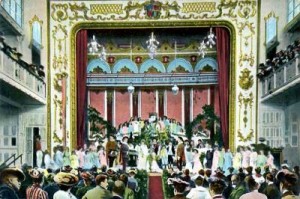
Historical novelist Tasha Alexander and I tweeted back and forth this morning, praising the Oxford English Dictionary.
It just gets better and better. Through a library—the wonder of libraries!—I have on-line access not only to the OED itself, but to its Historical Thesaurus. Can there be a more useful tool for a history geek?
Because my focus right now is on 17th century theatre, I’ve been assembling theatrical vocabulary using the OED, delighting in this research.
From the Greeks, we have proscenium, for example. We use the term proscenium arch today, referring to the frame through which we view the world of the play. In ancient Greek and Roman theatres, however, the proscenium was simply that area between the sets and edge of the stage.
One word I love—and am trying to work into the novel, if I dare—is vomitorium, the passage leading to the seats. A curious word, but it does conjure up the flowing image of the crowds of people leaving the performance.
If you are at all interested in the workings of the OED, and the delicious origin of words, there are some very good short videos on the Oxford University Press blog: here.
Here’s to your enjoyment…or, perhaps: adlubescence?


I’m so glad we got to bond over this! I’ve long been addicted to the OED, and the Historical Thesaurus is pretty much the best thing ever for anyone writing historicals….
Yes! It’s so nice to know someone who shares this passion, Tasha. So much history can be understood through words. I get downright giddy about it!